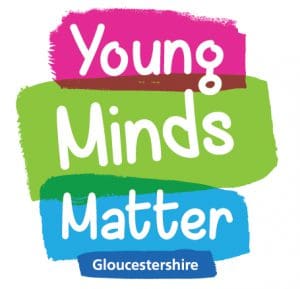Young Minds Matter (Trailblazer programme)
Young Minds Matter (YMM) is a safe and confidential mental health support service developed for children and young people up to 18 years of age in schools across Gloucestershire. We are proud to be part of the school's Trailblazer programme.

The team can offer you support if you are struggling with things like anxiety, low mood and poor sleep or similar concerns. This can be either face-to-face in school or via a virtual online platform. To meet with someone from Young Minds Matter you can ask a teacher/member of staff in the school to make a referral for you. Alternatively, if you attend a secondary school and would prefer not to talk to someone at school you can refer yourself into the team using YMMChat.

YMM Chat: 07480 635723 (Monday to Friday 9am – 4:30pm)
You can text whenever you need to… everybody feels worried and everybody gets stressed and this will take the pressure off.
YMM have a friendly team of YMM professionals who are available to chat on text message during the school day (between 9am until 4:30pm) Monday to Friday (except bank holidays). The team will aim to respond either the same day or the next working day.
Young people can contact us by text if they want to share something that is worrying them, to get some advice or to self-refer and get an appointment, without needing to ask a parent or a teacher if they would like to chat with one of the 1:1 practitioners to talk things through.
Young Minds Matter offer a safe, confidential space to work on the difficulties you are experiencing in a structured and focused way, we use something called Low Intensity Cognitive Behavioural Therapy, which helps us to think about how your thoughts (cognitions) impact on your actions (behaviours) and your feelings (emotions). You can speak to someone at school and ask to be referred or us our text service YMM Chat, to confidentially talk to one of our team and the options that are available for you.
What Will They Do?
The Mental Health Support Teams' (MHSTs') main role will be to provide earlier care for children and young people who may be experiencing mild to moderate or early symptoms of mental health problems, which tend to be outside the scope of traditional NHS services. Providing this additional resource to support early intervention, appropriate signposting and delivery of focused, evidence-based interventions will improve collaboration between schools and mental health services and enable earlier and more effective mental health support for children, young people, their families and carers. The Trailblazer programme will link a number of approaches, including working across the system to deliver a comprehensive training programme to increase knowledge and understanding of mental health, trauma and implementation of restorative practice, building resilience.
What are the Core Functions of a Mental Health Support Team (MHST)?
- Work with teachers and school staff to identify children and young people with emerging mental health needs, as part of a whole school approach to mental health and wellbeing;
- Build relationships across services to ensure joint delivery of care;
- Pilot a cultural and arts-led approach as an alternative and contemporary approach;
- Provide appropriate assessment of need, signposting and referral functions to a range of relevant services;
- Provide evidence-based interventions for children and young people who present with mild to moderate mental health problems in a school or college setting;
- Provide consultation and advice to other staff in schools and colleges around understanding children and young people’s mental health;
- Form part of an integrated referral system with specialist NHS children and young people’s mental health services to support children and young people who may present with more complex needs, or who require a more dedicated or intensive intervention.
What is a Mild to Moderate Mental Health Problem?
A moderate mental health problem is when a person has more symptoms that can make their daily life much more difficult than usual. Examples of this can be, but not limited to:
- Low mood
- Exam stress
- Mild anxiety
- Low self-esteem
- Friendship issues
- Daily worries & upset

